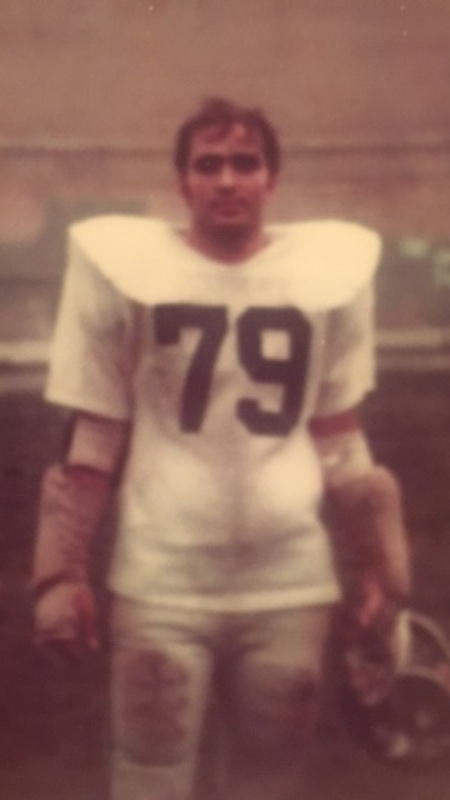Steven Dudowitz played offensive tackle at Lincoln High School in Brooklyn, New York and later at Geneva College in Pennsylvania. Dudowitz had at least six concussions during his playing career but his family suspects there were many more undocumented concussions. As Dudowitz aged, he became erratic, had severe mood swings, and had noticeable memory issues. He passed away in 2016 while in hospice care after a heart attack. After his death, his family donated his brain to the Boston University CTE Center and there he was diagnosed with tauopathy, a neurodegenerative disease related to Chronic Traumatic Encephalopathy (CTE).
Jim Proebstle, author of Unintended Impact, sat down with the family of Steven Dudowitz to gain insight into his life and legacy.
Steven Dudowitz: A Tragic Story
The story begins
As an outstanding offensive tackle for Lincoln High School in Brooklyn, NY, considered to be the perennial favorite football program in New York City, Steve’s journey is different. After graduating, “the Dude” as he was called, continued playing at Geneva College (formerly Beaver College) in Beaver Falls, Pennsylvania. At 6 foot 1 inch and 200 pounds, Steve was not your stereotypical offensive tackle and was put on the coach’s watch list for players who were too thin. He worked his way up to the second string, only to develop knee problems, which was his undoing for playing football his sophomore year. According to Boston University’s School of Medicine Clinical Report, Steve experienced six concussions, but no one really kept track of how many times you got your bell rung back then. With today’s knowledge of the damage incurred by repetitive nonconcussive blows to the head and the lack of sideline safety protocols for concussions in the 70’s, it’s hard to estimate the extent of impairment done to the brain.

A successful career interrupted
Steve developed a thriving career in the securities industry starting in 1979 in a classic style. He started in the mailroom. For the next 37 years Steve continued to assume additional responsibilities through job promotions, company changes and various mergers. The dedication and compassion he showed to those who worked for him was unparalleled. Yet, the fairy tale story wasn’t quite what it appeared to be. Control issues presented themselves. An under the radar substance abuse and alcohol issue contributed to a substantial weight gain to over 300 pounds. The corporate move in 1999 to Switzerland was partly designed for him to get back on track, as he seemed lost and unfocused by those who knew him best. In parallel, his first marriage came to an end.
In 2001, he met Juliette. They bought a house in 2003, had their only daughter, Stephanie, in 2004 and made it official by getting married in 2009. Along with Alexia, Juliette’s daughter from a previous marriage, they began a new life—no drugs, no alcohol—yet the job stresses continued to mount. His personality started to unravel, moments of extreme irritation and anger boiled over as an apparent loss of control led to OCD mannerisms in the strangest of circumstances. Erratic behaviors continued to worsen over time with noticeable memory issues in his mid-fifties. Steve closed down and began spending hours on end in his man-cave, by himself. His participation in the marriage was stunted and initial requests to see a psychologist were categorically rejected. Everything bothered him.
Mysterious changes
In October, 2014, it seemed as if Steve’s brain just flipped. Maybe the new company merger had an impact, but judgement and fault-finding became a normal part of many discussions, almost always over trivial events. Memory issues increased. Lifelong friends were dropped for no apparent reason. Juliette was struggling to understand what was happening with Steve with the sudden increase in financial challenges, credit card irregularities, spending splurges, strange disinhibitive behaviors, depression, anxiety, divorce threats, impulsivity, and explosive rages. Everything was coming at Juliette rapid fire with no reasonable explanation—the wheels were off. He was becoming more difficult to deal with as their lives took different paths. Juliette made up her mind to stick by Steve but he was no longer himself and she just didn’t know what to do. He was making comments about being in a bad place, about not knowing what’s wrong and, in general, about feeling strange and different. It was at this time that he agreed to finally go to seek therapy. Maybe he wasn’t having a mid-life crisis. Maybe he was sick.
It was during the movie, Concussion, with Steve and their daughters, Stephanie and Alexia, that Juliette made the connection with chronic traumatic encephalopathy (CTE) and Steve’s quickly devolving circumstances. Steve responded by looking at Juliette as if she were crazy..

Taupoathy: Closure… maybe
Steven had his heart attack on 5/12/16 and died on 6/13/16 while in hospice care. Juliette decided to contact Patrick Kiernan at Boston University School of Medicine CTE Center in order to donate Steve’s brain for research. The family received a different diagnosis from what they expected, however. The Clinical Report identified a neurodegenerative diagnosis called tauopathy. Related to CTE, tauopathy is somewhat different based on the unique deposition of neurofibrillary tangles. The unique findings in Steve’s brain opens a new door for future research as other cases are discovered. It would appear that the destructive path of concussions is not limited to a single answer (CTE) that could be made into a movie. The family is entering a new and frustrating world in search of more answers to connect the dots between Steven’s life and his untimely death.
Copyright © 2017, James Proebstle
